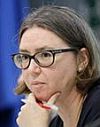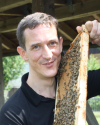Speakers
The following speakers have confirmed their participation in the Global Seminar.
For biographical information, please click on the speaker’s name.
Wednesday, 23 February 2022
Opening
Ms Chantal Marijnissen, Head of Unit Environment, Sustainable Natural Resources, Directorate-General for International Partnerships, European Commission
Mr David Cooper. Deputy Executive Secretary, Secretariat, Convention on Biological Diversity (CBD)
Mr Jingyuan Xia. Director, Plant Production and Protection Division, Food and Agriculture Organization of the United Nations (FAO)
Keynote presentations
Mr Simon Potts. School of Agriculture, Policy and Development, University of Reading, United Kingdom
Mr Parthiba Basu. Ecology Research Unit, Department of Zoology & Centre for Modern Biology, University of Calcutta, India
Mr Bill Garthwaite. FAO International Legal Expert – Development Law Service, USA
Mr André Krahner. Institute for Bee Protection, Julius Kühn Institute, Germany
Parallel Session 1 – Policy and legislation
Mr Thomas Steeger. United States Environmental Protection Agency, United States of America
Mr Karim Solyambingu. Tanzania Forest Services Agency, United Republic of Tanzania
Mr Klaus Berend. Directorate-General for Health and Food Safety, European Commission, Belgium
Parallel Session 2 – Risk assessment and mitigation
Ms Roberta Nocelli. Center for Agrarian Sciences, Federal University of São Carlos, Brazil
Ms Theresa Pitts Singer. United States Department of Agriculture – Agricultural Research Service, United States of America
Ms Domenica Auteri. European Food Safety Authority, Italy
Mr Jens Pistorius. Institute for Bee Protection, Julius Kühn Institute, Germany
Thursday, 24 February 2022
Keynote presentations
Mr Rémy Vandame. El Colegio de la Frontera Sur, Mexico
Mr Buyung Hadi. Plant Production and Protection Division, FAO, Italy
Mr Vujadin Kovacevic. Directorate General for Environment, European Commission, Belgium
Ms Sofie Hofkens. Directorate-General for Health and Food Safety, European Commission, Belgium
Ms Barbara Gemmill-Herren. Faculty of Susainable Food Systems, Prescott College, United States of America
Closure
Mr Frederic Castell. Office of Climate Change, Biodiversity and Environment, FAO, Italy
Mr Baogen Gu. Team Leader – Pest and Pesticide Management. Plant Production and Protection Division, FAO, Italy
Chantal Marijnissen
 Chantal Marijnissen is the Head of Unit for Environment, Sustainable Natural Resources in DG INTPA at the European Commission. Prior to this posting, she was the Acting Head of Unit for Effectiveness and Financing, where she negotiated the Addis Ababa Action Agenda on behalf of the EU and its Member States and Development Effectiveness Agenda (2014-2016). Chantal was also responsible for the multiannual programming of the European Development Fund and methodological aspects of EU development cooperation (2007-2014).
Chantal Marijnissen is the Head of Unit for Environment, Sustainable Natural Resources in DG INTPA at the European Commission. Prior to this posting, she was the Acting Head of Unit for Effectiveness and Financing, where she negotiated the Addis Ababa Action Agenda on behalf of the EU and its Member States and Development Effectiveness Agenda (2014-2016). Chantal was also responsible for the multiannual programming of the European Development Fund and methodological aspects of EU development cooperation (2007-2014).
She was the economic advisor to the EU Delegation in Chad (2004-2007). Before working in the Commission, she worked for an environmental NGO, FERN, on trade and Forest Law Enforcement, Governance and Trade (FLEGT) (1998 -2004) and for the International Institute on Environment and Development on forest certification (1996-1998).
David Cooper
 David Cooper is Deputy Executive Secretary at the Secretariat of the Convention on Biological Diversity, where he coordinates the strategic and planning activities of the Secretariat as well as the intergovernmental processes under the Convention.
David Cooper is Deputy Executive Secretary at the Secretariat of the Convention on Biological Diversity, where he coordinates the strategic and planning activities of the Secretariat as well as the intergovernmental processes under the Convention.
Earlier, he worked at the UN Food and Agriculture Organization, for the non-governmental organization GRAIN and in the UK Agricultural Research Council.
David worked on many scientific assessments, including the Millennium Ecosystem Assessment. He was a resource person supporting the IPBES Global Assessment and lead author for the fifth edition of the Global Biodiversity Outlook.
Jingyuan Xia
 Jingyuan Xia is the Director of Plant Production and Protection Division (NSP) of the FAO. Prior to his present position, from 2015 to 2019, he was the Secretary to the International Plant Protection Convention (IPPC) at FAO headquarters in Rome. Before joining the FAO, from 2012 to 2014, Dr Xia was serving as Permanent Representative and Minister Plenipotentiary at the China Mission to the United Nations Agencies for Food and Agriculture in Rome. Between 2001 and 2011, he served as Director General and Extension Professor at the National Agro-Tech Extension and Service Center (NATESC) of the Ministry of Agriculture in Beijing. Between 1993-2000, he worked as Assistant Director General, Deputy Director General and Director General as well as Research Professor at the China Cotton Research Institute (CCRI) of the Chinese Academy of Agricultural Sciences (CAAS) in Anyang.
Jingyuan Xia is the Director of Plant Production and Protection Division (NSP) of the FAO. Prior to his present position, from 2015 to 2019, he was the Secretary to the International Plant Protection Convention (IPPC) at FAO headquarters in Rome. Before joining the FAO, from 2012 to 2014, Dr Xia was serving as Permanent Representative and Minister Plenipotentiary at the China Mission to the United Nations Agencies for Food and Agriculture in Rome. Between 2001 and 2011, he served as Director General and Extension Professor at the National Agro-Tech Extension and Service Center (NATESC) of the Ministry of Agriculture in Beijing. Between 1993-2000, he worked as Assistant Director General, Deputy Director General and Director General as well as Research Professor at the China Cotton Research Institute (CCRI) of the Chinese Academy of Agricultural Sciences (CAAS) in Anyang.
Simon Potts
 Simon Potts is Professor of Biodiversity and Ecosystem Services at the University of Reading, UK. He is the Director of the Centre for Agri-Environmental Research, which focuses on providing research to support practices and policies to intensify food production while minimising negative environmental impacts. The Centre is a world-leader in the sustainable management of pollination services and pollinator conservation.
Simon Potts is Professor of Biodiversity and Ecosystem Services at the University of Reading, UK. He is the Director of the Centre for Agri-Environmental Research, which focuses on providing research to support practices and policies to intensify food production while minimising negative environmental impacts. The Centre is a world-leader in the sustainable management of pollination services and pollinator conservation.
Over the last 30 years he has worked closely with researchers, industry, NGOs and policymakers on the role of biodiversity and ecosystem services in farming systems in Europe, Africa, Asia and North and South America.
Simon is the co-chair of the UN IPBES, assessment of ‘Pollinators, pollination and food production’. He has a wide variety of advisory roles with the UN, FAO, EU, national governments as well as agri-food industry and NGOs.
Parthiba Basu
 Parthiba Basu has a Ph.D. in Ecology and has research career spanning nearly thirty years. He teaches at the Department of Zoology and heads the Centre for Agroecology and Pollination Studies at the University of Calcutta India. His research focus is biodiversity and ecosystem service delivery in agroecosystems. The status of pollinators and drivers of their decline in agroecosystems is an ongoing area of his research. He presently serves a Lead member of the IUCN Wild bee Specialist Group and has been part expert panel on pollinators for the UN-FAO.
Parthiba Basu has a Ph.D. in Ecology and has research career spanning nearly thirty years. He teaches at the Department of Zoology and heads the Centre for Agroecology and Pollination Studies at the University of Calcutta India. His research focus is biodiversity and ecosystem service delivery in agroecosystems. The status of pollinators and drivers of their decline in agroecosystems is an ongoing area of his research. He presently serves a Lead member of the IUCN Wild bee Specialist Group and has been part expert panel on pollinators for the UN-FAO.
André Krahner
 André Krahner is a researcher at the Institute for Bee Protection within the Julius Kühn Institute (JKI) - Federal Research Centre for Cultivated Plants, which is both a federal research institute and a higher federal authority in Germany. His research activities focus on bee diversity in relation to local and landscape factors, including pest management. He is active in the German and European pesticide regulatory risk assessment regarding honey bees and other commercially relevant pollinators. André joined the JKI in 2017, after finishing his PhD thesis on hymenopteran biodiversity in vineyards at the University of Trier (Germany) and his MSc thesis on ant communities at the University of Cape Town (South Africa).
André Krahner is a researcher at the Institute for Bee Protection within the Julius Kühn Institute (JKI) - Federal Research Centre for Cultivated Plants, which is both a federal research institute and a higher federal authority in Germany. His research activities focus on bee diversity in relation to local and landscape factors, including pest management. He is active in the German and European pesticide regulatory risk assessment regarding honey bees and other commercially relevant pollinators. André joined the JKI in 2017, after finishing his PhD thesis on hymenopteran biodiversity in vineyards at the University of Trier (Germany) and his MSc thesis on ant communities at the University of Cape Town (South Africa).
Thomas Steeger
Thomas Steeger currently serves as a Senior Science Advisor in the Environmental Fate and Effects Division of EPA Office of Pesticide Programs where he has worked for the past 26 year. He has served as one of the lead technical advisors on the development of the EPA guidance for assessing the risk of pesticides to bees and on the development of the U.S. National Strategy to Promote the Health of Honey Bees and Other Pollinators. Dr. Steeger serves as the U.S. delegate to the Organization for the Economic Cooperation and Development (OECD) honey bee toxicity test expert group and on the OECD Expert Group on Pollinator Testing and Assessment. Dr. Steeger currently serves on the steering committee of the International Commission on Plant-Pollinator Relationships Bee Protection work group and as EPA’s ex officio representative in the Honey Bee Health Coalition. Most recently, he assisted in coordinating the USDA/EPA-hosted Pollinator State-of-the-Science Workshops in 2020 and 2021.
Karim Solyambingu
 Karim Solyambingu is a dedicated Lawyer who holds a Bachelor Degree of Laws (LL.B) and Scholar of Master of Laws Degree (LL.M) in Environmental Law, Policy and Regulations at the Open University of Tanzania since 2021. He is currently working with the Tanzania Forest Services Agency, a Government Semi-autonomous Agency which is mandated to ensure Sustainable Management, Protection and Utilization of Forestry and Bee Resources in Tanzania. He is also a Beekeeping Officer who worked in the Field of Beekeeping with local beekeepers since 2014. Worked in the area of Public awareness as a Head of Extension Services in Western Zone on Environmental Protection, Forest Conservation and Compliance to Forest and Beekeeping Legislations in Tanzania.
Karim Solyambingu is a dedicated Lawyer who holds a Bachelor Degree of Laws (LL.B) and Scholar of Master of Laws Degree (LL.M) in Environmental Law, Policy and Regulations at the Open University of Tanzania since 2021. He is currently working with the Tanzania Forest Services Agency, a Government Semi-autonomous Agency which is mandated to ensure Sustainable Management, Protection and Utilization of Forestry and Bee Resources in Tanzania. He is also a Beekeeping Officer who worked in the Field of Beekeeping with local beekeepers since 2014. Worked in the area of Public awareness as a Head of Extension Services in Western Zone on Environmental Protection, Forest Conservation and Compliance to Forest and Beekeeping Legislations in Tanzania.
Klaus Berend
 Klaus Berend joined the European Commission in 1994 and is currently Head of Unit in the Directorate-General Health and Food Safety, responsible for the implementation of the Pesticides and Biocides legislation.
Klaus Berend joined the European Commission in 1994 and is currently Head of Unit in the Directorate-General Health and Food Safety, responsible for the implementation of the Pesticides and Biocides legislation.
Previously, he was Head of Unit in charge of the implementation of the EU Regulation concerning the Registration, Evaluation, Authorisation and Restriction of Chemicals (REACH) and, earlier Head of Unit responsible for EU legislation on the Classification, Labelling and Packaging of substances and mixtures (CLP), Good Laboratory Practices (GLP), detergents, fertilisers, drug precursors, explosives and pyrotechnic articles.
He studied chemistry at the universities of Heidelberg, Freiburg, and Stanford, and obtained a PhD in polymer chemistry from the University of Freiburg (Germany).
Roberta Nocelli
 Roberta Nocelli is a biologist, researcher at the Center for Agricultural Sciences - UFSCar Araras campus, where she develops research projects on bee biology and the effects of different stressors such as pesticides, changes in the landscape and climate change on these important pollinating insects and the consequences in the provision of ecosystem services and in food production. She is a member of the bee expert group at the Organization for Economic Co-operation and Development (OECD). She coordinates studies for the development of toxicity tests for stingless bees and the stingless bees subgroup in the ICPPR non-Apis bees working group.
Roberta Nocelli is a biologist, researcher at the Center for Agricultural Sciences - UFSCar Araras campus, where she develops research projects on bee biology and the effects of different stressors such as pesticides, changes in the landscape and climate change on these important pollinating insects and the consequences in the provision of ecosystem services and in food production. She is a member of the bee expert group at the Organization for Economic Co-operation and Development (OECD). She coordinates studies for the development of toxicity tests for stingless bees and the stingless bees subgroup in the ICPPR non-Apis bees working group.
Theresa Pitts-Singer
 Theresa Pitts-Singer has been a Research Entomologist at the USDA-ARS Pollinating Insects Research Unit in Logan, Utah USA since 2002. Her stakeholder-focused research pertains to improving the management and sustainability of alfalfa leafcutting bees and blue orchard bees for U.S. crops. She examines factors that affect bee reproduction and pollination efficacy, chemical cues that are used in nest establishment and individual nest recognition, and effects of certain pesticides on bee mortality and behavior. She has authored or co-authored over 60 journal articles, co-edited a book, written four book chapters, and co-invented two U.S. patents.
Theresa Pitts-Singer has been a Research Entomologist at the USDA-ARS Pollinating Insects Research Unit in Logan, Utah USA since 2002. Her stakeholder-focused research pertains to improving the management and sustainability of alfalfa leafcutting bees and blue orchard bees for U.S. crops. She examines factors that affect bee reproduction and pollination efficacy, chemical cues that are used in nest establishment and individual nest recognition, and effects of certain pesticides on bee mortality and behavior. She has authored or co-authored over 60 journal articles, co-edited a book, written four book chapters, and co-invented two U.S. patents.
Domenica Auteri
 Domenica Auteri is a biologist with a post-graduate degree in toxicology. She has been working in the field of environmental risk assessment of pesticides since more than 25 yrs. She joined the European Food Safety Authority (EFSA) in 2008 as ecotoxicologist. Since 2011, she has been leading the team responsible for the evaluation of the risk of pesticides to non-target organisms and for the development of guidance documents. Among the activities she was responsible for with her team, there are the review of the neonicotinoids, the guidance document to identify endocrine disruptors, the ongoing the revision of guidance document for birds&mammals and the guidance document for bees.
Domenica Auteri is a biologist with a post-graduate degree in toxicology. She has been working in the field of environmental risk assessment of pesticides since more than 25 yrs. She joined the European Food Safety Authority (EFSA) in 2008 as ecotoxicologist. Since 2011, she has been leading the team responsible for the evaluation of the risk of pesticides to non-target organisms and for the development of guidance documents. Among the activities she was responsible for with her team, there are the review of the neonicotinoids, the guidance document to identify endocrine disruptors, the ongoing the revision of guidance document for birds&mammals and the guidance document for bees.
Jens Pistorius
 Jens Pistorius works at the Julius Kühn-Institut (JKI), Federal Research Centre for Cultivated Plants, which is both a federal research institute and a higher federal authority. Dr. Jens Pistorius is the head of the Institute for Bee Protection in the JKI. He is a beekeeper since 2 decades and has worked as study director for bee health studies. In the JKI his work covers strategies, methodologies and conduct of risk assessment of pesticides on honey bees, the investigation of honey bee poisoning incidents and on federal research activities on honey bees and wild bees, pesticides, agroecology, their interactions and factors that may have an impact on bee health.
Jens Pistorius works at the Julius Kühn-Institut (JKI), Federal Research Centre for Cultivated Plants, which is both a federal research institute and a higher federal authority. Dr. Jens Pistorius is the head of the Institute for Bee Protection in the JKI. He is a beekeeper since 2 decades and has worked as study director for bee health studies. In the JKI his work covers strategies, methodologies and conduct of risk assessment of pesticides on honey bees, the investigation of honey bee poisoning incidents and on federal research activities on honey bees and wild bees, pesticides, agroecology, their interactions and factors that may have an impact on bee health.
Rémy Vandame
 Rémy Vandame is a researcher at El Colegio de la Frontera Sur, a public research center located in Chiapas, southern Mexico. He leads a team of 25 people pursuing two goals. On the scientific side, the team studies the diversity, distribution and ecology of tropical bees in Mesoamerica. On the educational side, the team accompanies farmer organizations to support honey production and crop pollination as levers to provide human well-being and environmental protection. Rémy participates in national and international committees; in particular, he was one of the authors of the IPBES report on "Pollinators, Pollination and Food Production", and co-chairs the IUCN Wild Bee Specialist Group.
Rémy Vandame is a researcher at El Colegio de la Frontera Sur, a public research center located in Chiapas, southern Mexico. He leads a team of 25 people pursuing two goals. On the scientific side, the team studies the diversity, distribution and ecology of tropical bees in Mesoamerica. On the educational side, the team accompanies farmer organizations to support honey production and crop pollination as levers to provide human well-being and environmental protection. Rémy participates in national and international committees; in particular, he was one of the authors of the IPBES report on "Pollinators, Pollination and Food Production", and co-chairs the IUCN Wild Bee Specialist Group.
Buyung Hadi
 Buyung Hadi serves as an Agricultural Officer (IPM) in Pest and Pesticide Management Team under FAO’s Plant Production and Protection Division. He coordinates the Secretariat for the Global Action for Fall Armyworm Control, among others. His professional interests include population and community ecology in agroecosystems, development of IPM strategies and their enabling socio-economic and policy environments. Before joining FAO, Buyung worked at the International Rice Research Institute and at South Dakota State University.
Buyung Hadi serves as an Agricultural Officer (IPM) in Pest and Pesticide Management Team under FAO’s Plant Production and Protection Division. He coordinates the Secretariat for the Global Action for Fall Armyworm Control, among others. His professional interests include population and community ecology in agroecosystems, development of IPM strategies and their enabling socio-economic and policy environments. Before joining FAO, Buyung worked at the International Rice Research Institute and at South Dakota State University.
Vujadin Kovacevic
 Vujadin Kovacevic is a policy officer for biodiversity at the Directorate General for Environment of the European Commission. His current responsibilities include the development and implementation of the EU biodiversity policy framework, namely the first-ever EU action on the conservation of wild pollinators. He is a biologist with experience in ecology, renewable energy and environmental economics, having completed two Masters – of Science in Biology at the University of Zagreb, and of Environmental Science, Economics and Natural Resources Management at Wageningen University.
Vujadin Kovacevic is a policy officer for biodiversity at the Directorate General for Environment of the European Commission. His current responsibilities include the development and implementation of the EU biodiversity policy framework, namely the first-ever EU action on the conservation of wild pollinators. He is a biologist with experience in ecology, renewable energy and environmental economics, having completed two Masters – of Science in Biology at the University of Zagreb, and of Environmental Science, Economics and Natural Resources Management at Wageningen University.
Sofie Hofkens
 Sofie Hofkens joined the European Commission in 2013 and works as a Policy Officer in the Unit responsible for the implementation of the legislation on plant protection products at the Directorate-General Health and Food Safety. Her current responsibilities include the approvals of active substances, and in particular all topics related to the protection of bees and other pollinators.
Sofie Hofkens joined the European Commission in 2013 and works as a Policy Officer in the Unit responsible for the implementation of the legislation on plant protection products at the Directorate-General Health and Food Safety. Her current responsibilities include the approvals of active substances, and in particular all topics related to the protection of bees and other pollinators.
Previously, she worked at the European Food Safety Authority as an ecotoxicologist in the Pesticides Peer review.
She studied Bioscience Engineering (agronomy) at the universities of Antwerp and Ghent.
Barbara Gemmill-Herren
 Barbara Gemmill-Herren is an Associate Faculty at Prescott College, Prescott, Arizona, USA, teaching Food Systems, Biodiversity and Ecosystem Services and Advanced Food and Agriculture Policy. She was Coordinator of the International Pollinator Initiative and Delivery Manager for Ecosystem Services and Biodiversity at the Food and Agriculture Organization of the United Nations (FAO), responsible for work on Pollination, Ecosystem Services in Agricultural Production, and Agroecology. She was a project team member of the Committee on World Food Security of the UN, High-Level Panel of Experts Report on “Agroecological and other innovative approaches for sustainable agriculture and food systems that enhance food security and nutrition”.
Barbara Gemmill-Herren is an Associate Faculty at Prescott College, Prescott, Arizona, USA, teaching Food Systems, Biodiversity and Ecosystem Services and Advanced Food and Agriculture Policy. She was Coordinator of the International Pollinator Initiative and Delivery Manager for Ecosystem Services and Biodiversity at the Food and Agriculture Organization of the United Nations (FAO), responsible for work on Pollination, Ecosystem Services in Agricultural Production, and Agroecology. She was a project team member of the Committee on World Food Security of the UN, High-Level Panel of Experts Report on “Agroecological and other innovative approaches for sustainable agriculture and food systems that enhance food security and nutrition”.
Frédéric Castell
 Frédéric Castell is a Senior Natural Resources Officer at OCB. Frédéric Castell has been working for twenty years on the links between biodiversity conservation and sustainable agriculture. He has supported the development of policies and projects in different countries, including Gambia, Madagascar, Vietnam, and France as well as for the public service, research institutions, development agencies and NGOs. After being advisor to the Deputy Director General, Climate and Natural Resources of FAO over the last 8 years, in his current role Frédéric oversees and coordinates the implementation of the biodiversity strategy to mainstream biodiversity across agricultural sectors.
Frédéric Castell is a Senior Natural Resources Officer at OCB. Frédéric Castell has been working for twenty years on the links between biodiversity conservation and sustainable agriculture. He has supported the development of policies and projects in different countries, including Gambia, Madagascar, Vietnam, and France as well as for the public service, research institutions, development agencies and NGOs. After being advisor to the Deputy Director General, Climate and Natural Resources of FAO over the last 8 years, in his current role Frédéric oversees and coordinates the implementation of the biodiversity strategy to mainstream biodiversity across agricultural sectors.
Baogen Gu
 Baogen Gu has been the team leader of Pest and Pesticide Management in Plant Protection and Protection Division, FAO, since 2016. He started working on pesticide management in the Ministry of Agriculture and Rural Affairs in China in 1988, and as the pesticide registrar, was responsible for pesticide registration from 2000 to 2005 and 2008 to 2014. He was the deputy director of the department of agriculture in the Xinjiang provincial government from 2005 to 2008 and the deputy director of the Centre for Quality and Safety of Agricultural Products (MARA), China from 2015 to 2016.
Baogen Gu has been the team leader of Pest and Pesticide Management in Plant Protection and Protection Division, FAO, since 2016. He started working on pesticide management in the Ministry of Agriculture and Rural Affairs in China in 1988, and as the pesticide registrar, was responsible for pesticide registration from 2000 to 2005 and 2008 to 2014. He was the deputy director of the department of agriculture in the Xinjiang provincial government from 2005 to 2008 and the deputy director of the Centre for Quality and Safety of Agricultural Products (MARA), China from 2015 to 2016.


